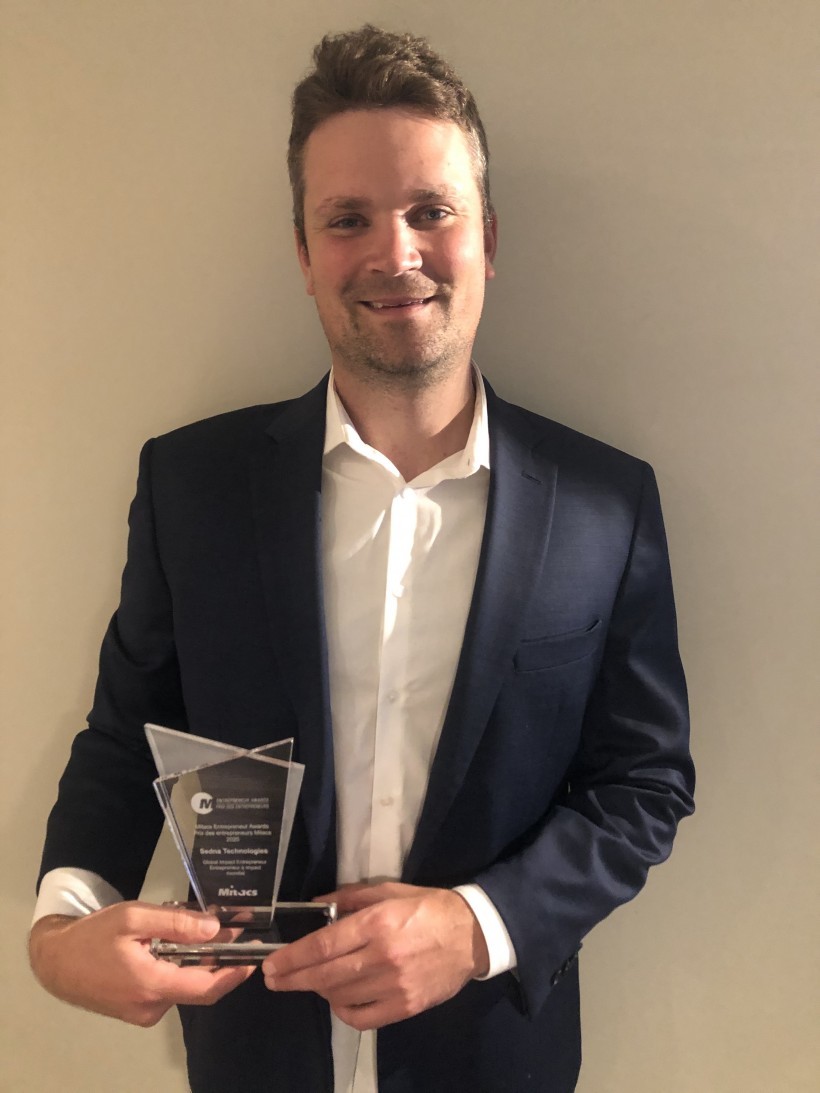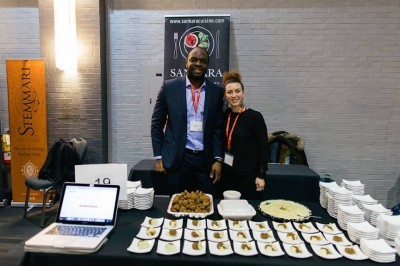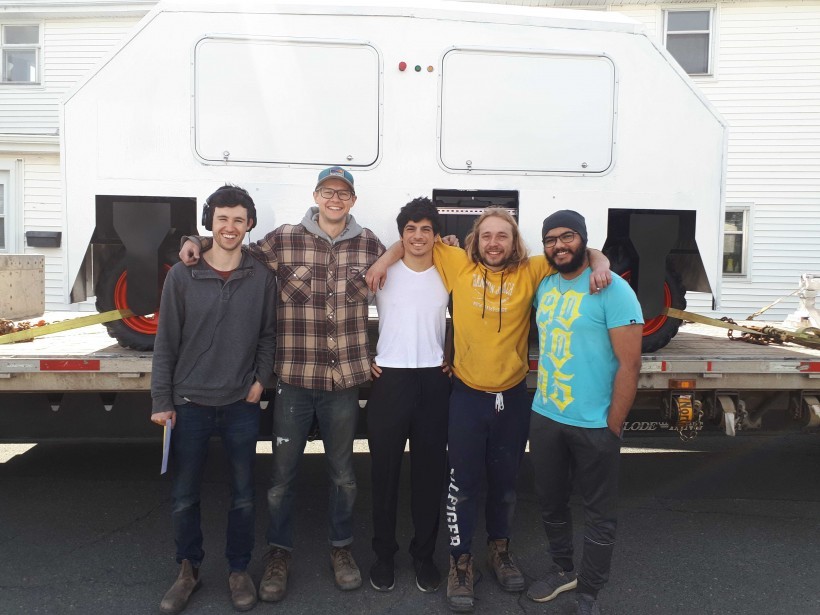Halifax Startups and Companies Continue to Advance
October 5, 2020
By Carol Moreira
In September, startups and established companies made important progress in the Halifax Innovation District. There were mergers and acquisitions, successful funding raised, and continued collaboration and partnerships.
mCube Buys Kinduct
Sportstech company Kinduct has been sold to mCube, a Silicon Valley venture that makes the world’s smallest sensors. The sale price was not revealed by Kinduct, which will remain based in Halifax.
“I do believe it will be the biggest exit by a majority-owned, Nova Scotia-backboned tech company and the biggest sports-tech exit in Canada,” Kinduct CEO Travis McDonough told Entrevestor.

McDonough said the Kinduct sale price exceeds the reported $70 million that Salesforce paid for GoInstant in 2012. The 2017 sale of STI Technologies was said to be more than $200 million, but McDonough said STI was majority-owned by a private equity company based in Toronto.
Kinduct’s platform provides customized health data to some of the world’s top athletes and sports teams. mCube is a provider of sensor solutions and analyzes motion data for different applications. The merger will allow the data on human motion captured by mCube sensors to be analyzed by Kinduct’s software.
Kinduct will maintain its sports business but is also targeting the healthcare market and recently inked a deal with the Nova Scotia Health Authority. McDonough said the marriage with mCube will boost its international growth and development in the healthcare sector.
CarbonCure’s Funding Led by Amazon and Breakthrough
CarbonCure Technologies raised a funding round led by Amazon and Breakthrough Energy Ventures, an impact fund backed by billionaires such as Michael Bloomberg and Bill Gates. CEO Robert Niven told Entrevestor he thinks it is the largest cleantech financing round in Canada in 2020.

The announcement follows Canadian eCommerce venture Shopify announcing that its $5 billion Sustainability Fund would purchase carbon offsets from CarbonCure. CarbonCure did not say how much it had raised but that there were many potential investors. “Our round was three to five times over-subscribed so we just picked the dream-team investors, mainly tech firms and large property developers,” Niven said.
CarbonCure injects CO2 into concrete, producing a stronger product while cutting carbon emissions. The company aims to prevent 500 megatonnes of CO₂ from being emitted every year by 2030. Companies like Amazon, Shopify and Microsoft are important to the cleantech sector, with many vowing to be carbon neutral by 2040.
CarbonCure’s clients include around 300 concrete producers across the world. Amazon uses CarbonCure technology in its buildings. “Amazon is already our largest customer in terms of purchasing concrete,” Niven said.
Metamaterial to Gain Nasdaq Listing with Merger
Metamaterial Inc., a company which makes products from manmade materials that alter light, will merge with an American company, gaining a listing on the Nasdaq stock exchange and around C$13.3 million in financing.
The merged venture will keep the Metamaterial name and management and its Dartmouth HQ. The U.S. company, Torchlight Energy Resources, is a Texas oil and gas producer that intends to sell its oil and gas assets. The company saw Meta as an opportunity to pivot away from the declining hydrocarbon market and into new technology.
“I’m excited that an oil and gas company will divest its existing assets and look to a business like ours,” George Palikaras, Metamaterial President and CEO, told Entrevestor. “There is a shift happening right now in the marketplace and companies like Meta that are focusing on sustainable technologies are coming in at the right time.”
Metamaterial’s products alter light by repelling, magnifying or filtering it. The company has a metaAIR venture with Airbus, which is creating a covering for airplane cockpit windows to block laser attacks. The company was already listed on the alternate Canadian Stock Exchange and will now have a dual listing.
“There is a significant value in a company like ours to having a national listing in the United States,” Palikaras said.
Appili Moves to Main Board of Toronto Stock Exchange
Appili Therapeutics Inc.’s common shares began trading on the main board of the Toronto Stock Exchange after spending 15 months on the TSX Venture exchange. The company is bringing a group of anti-infectious drugs to market. The move to the main TSX board will give the company exposure to more investors and help it raise capital.
Appili started trading on the TSX exchange last year. In 2020, it has twice issued stock to raise $27 million.
The company is also applying to the U.S. Food and Drug Administration to conduct a Phase 3 clinical study of its drug candidate Favipiravir to treat mild-to-moderate COVID-19 infections. Favipiravir is an antiviral used in Japan under the name Avigan.
Volta Partners with Silicon Valley Bank
Halifax innovation hub Volta has announced a strategic partnership with Silicon Valley Bank, a bank used by global innovation ventures and investors. The partnership gives the Volta community greater insight into the innovation economy, access to investors, bankers and mentors, Volta News reported.
“SVB has worked with some leading innovators, so they can provide knowledge and insights that will be extremely valuable for our Residents as they grow their companies and scale,” said Volta CEO Martha Casey.
Silicon Valley Bank began operations 35 years ago. The bank has worked in the Canadian market since the start of the century and opened a Toronto office last year.
Ocean Supercluster in Indigenous Work Project
Canada’s Ocean Supercluster along with First Nations community partners has launched a program to help Indigenous workers find job placements in the ocean economy. The Indigenous Career Pivot Project will cost more than $740,000, of which $550,000 will come from the Supercluster. The pilot project will grant 10 mid-career Indigenous people who work in other sectors a 12-month work placement with small to medium-sized oceans companies.
The Ocean Supercluster is a federal government national research supercluster which aims to spend around $350 million in oceantech R&D over five years.
Kenneth Paul, a member of New Brunswick’s Maliseet First Nations said Indigenous people are active in the commercial fishery but not in other oceans areas. He said young people often don’t appreciate the scope of opportunity available because of a lack of role models.
MacDonald Wins Mitacs Award
Sheamus MacDonald, an entrepreneur who works to enhance the sustainability of fish stocks and protect fish product supply chains has won a Mitacs Entrepreneur Award. The President and Co-Founder of Sedna Technologies, MacDonald was named Global Impact Entrepreneur by Mitacs, a non-profit that boosts Canadian innovation.

Sedna’s technology tracks the condition of harvested fish as they are moved through supply chains. “If you harvest a resource, the main thing is to make use of it. Cutting waste in supply chains is one way to do that,” MacDonald told Entrevestor.
Clean Catch Wins AquaHacking Contest
Clean Catch Baits, a creator of environmentally friendly fishing lures, won $23,000 in the first AquaHacking Challenge held in the Atlantic region.The company, which was recently formed at Saint Mary’s University, is creating biodegradable, PVC-free soft bait fishing lures. They aim to replace plastic lures that can leach micro-plastics into waterways.
“This is a great prize and it will give us a lot of opportunity to move forward, especially because we’re getting close to finalizing our packaging and our branding,” Co-Founder Guillermo Villarreal De Lara told Entrevestor.
The AquaHacking Challenges are nine-month national initiatives in which competitors strive to solve problems. This iteration was organized by SMU’s Atlantic Water Network.
Clean Catch has also won a place at Start-Up Yard in the COVE premises in Dartmouth. Villarreal and his partners hope to launch their product in retail stores next year. It is also building an ecommerce site.
Boris Worm Named OFI’s First Ambassador
Boris Worm, a Dalhousie University marine ecology researcher, is the first person inducted into the Ocean Frontier Institute’s Ambassador Program.
Worm is the founder and host of Ocean School, an ocean-education platform, and the "Oceans Guy" on CBC Radio’s Mainstreet. His new role will see him boosting ocean literacy, Dal News reported.
“We can’t help heal the ocean unless we know what is happening there and how it affects us,” Worm said. “Ocean literacy is all about that, combined with an awareness of and how our choices matter to ocean health."
OFI links ocean researchers at Dalhousie, University of Prince Edward Island and Memorial University with national and global partners to produce research recommendations that help in making government policy, community development, and industry needs. OFI will soon appoint more ambassadors with specialties in areas such as biodiversity, social science and technology.
Volta and Shiftkey Labs Launch New Program
Shiftkey Labs, Dalhousie’s computer science software innovation sandbox, has launched the Shiftkey Connects Program with Volta. The program matches computer science students with startups working at Volta so they can conduct user testing.
“This program…supports startups, which are an integral part of our local economy and it provides students with experiential learning opportunities,” Akram Al-Otumi, Director of Shiftkey Labs and a lecturer in tech innovation at Dalhousie, told Volta News.
The ongoing program will be open to both undergraduate and masters students and aims to accept five groups each term.
Al-Otumi has also been named Global Enactus Alumni for 2020. Enactus is a global group that helps students create social ventures – companies that assist society or the environment. He previously won the 2015 Enactus Alumni of the Year Award for Canada and was named an Enactus John Dobson Fellow.
Medical Membrane Approved
DMF Medical gained a Class II medical device license from Health Canada that allows it to sell its memsorb carbon dioxide filtration device.
Memsorb is a CO2 removal system for use in general anesthesia. It uses membrane technology instead of a chemical reaction to improve the way carbon dioxide is removed from the system that puts patients to sleep.
The company said the traditional process of putting patients to sleep releases CO2 and chemicals and the impact worldwide is equivalent to producing 4.4 million tons of CO2 a year. The residue chemicals produce 115,000 cubic metres of solid waste annually. Memsorb’s membrane lasts for several months and can be recycled.
Halifax’s Truleaf Now Growing Microgreens in Ontario as GoodLeaf
An indoor vertical farm run by Nova Scotia and Ontario-based GoodLeaf Farms has become fully operational in Guelph. The 4,000-square-metre automated farm grows microgreens and baby greens all year without pesticides, fungicides or herbicides and with reduced water consumption.
Vertical farming grows plants with hydroponics under LED lights that maximize photosynthesis. The process requires 95 percent less water than a traditional farm and creates no waster-contamination issues. Lengthy supply chains are eliminated and land-use pressures are reduced.
“The pandemic has underscored how important it is to have access to local food sources – food that we know is safe, grown responsibly and immune to border closures,” Jacquie Needham, Accounts Manager for GoodLeaf Farms, said in a statement.
GoodLeaf was initially TruLeaf Sustainable Agriculture, founded in Halifax in 2011 by Gregg Curwin. In 2015, GoodLeaf built a pilot farm near Truro, and in 2019, the company established its full-scale commercial farm in Ontario. The company is now looking to expand in the Atlantic region and on the west coast.
Online Cultural Marketplace Coming to Halifax
Before the pandemic, Sankara offered catering and in-person events built around ethnic food. COVID-19 shut those markets and now the venture is delivering meal boxes of pre-cooked food to homes, a service the online multicultural marketplace will soon bring to Halifax.
Sankara allows refugee and immigrant chefs, grocers, and creators of jewellery and other products to sell free to the public in various New Brunswick cities. The meal box program provides five precooked meals in boxes that are delivered to clients’ doorsteps. All food is made in licensed kitchens.
Co-Founder Lily Lynch told Entrevestor the pandemic has forced people to buy online, and Sankara’s service offers kitchen-weary clients food diversity. The company will move to Halifax this fall and is seeking partners, investors, and mentors in the city.

REDspace Celebrates 20th Anniversary
Software development company REDspace has experienced strong growth despite the pandemic as executives used the crisis to upgrade their IT platforms. The company’s main areas of focus are entertainment, learning, and defence with clients like WarnerMedia and MTV.
The venture has grown as streaming services have boomed. Last year, revenue rose 45 percent and the company upped its employees to a total of 224. REDspace is now adding another 14,000 square feet of space to its 23,000-square-foot HQ.
“The entire world is stuck at home,” Johnston told Entrevestor. “Everyone [in the entertainment industry] is trying to carry out their strategic plans, so there’s a lot of demand to get apps on their networks.”
Greenlight Assesses Cannabis and Food
Greenlight Analytical received a $374,250 loan from the Atlantic Canada Opportunities Agency, to help with launching a device that measures chemicals in food and cannabis. The company is building a modified mass spectrometer and an AI system that translates the spectrometer’s output into an understandable format.
In a statement, the company said there is currently no quick and reliable method of testing cannabis crops during growth and flowering, meaning their quality and safety is unknown until after harvest. More than 70 jurisdictions around the globe are legalizing or decriminalizing cannabis and consumers are developing sophisticated preferences.
Greenlight plans to initially focus on the cannabis sector then diversify into the agrifood market. The company is raising capital, targeting a total of $750,000.
“While the worldwide pandemic has slowed economic development across most sectors, sales of legal recreational and medical cannabis have remained strong,” Greenlight CEO James Wylde told Entrevestor.
Funding for Weed-Picking Robot
Nexus Robotics has received $550,000 from the Atlantic Canada Opportunities Agency to help bring its weed-picking robot to market. Nexus addresses a problem faced by vegetable farmers, who must remove weeds without damaging crops. Weeding costs North American farmers around $1.5 billion every year and is carried out by labourers, a strategy which has proven challenging during the pandemic.
The autonomous Nexus robot uses AI to differentiate and remove weeds. The robot can weed fields 24 hours a day and eliminates the need to use pesticides. The technology boosts efficiency, decreases environmental footprint and saves money.

Halifax Green Startup Expands
Sustainably Stocked, a green e-commerce venture, is honing its operations before growing into other Canadian cities.
The company sells staples such as salt, sugar and almonds in reusable compostable paper containers or glass jars in order to cut plastic waste. The venture’s e-commerce site allows users to receive products at their doors. The food is delivered either in paper bags or reusable glass jars.
Co-founder Dessie Maliaka told Entrevestor delivery routes are planned to avoid wasting fuel, allowing clients to know exactly when their orders will arrive.
Carol Moreira is a Principal of Entrevestor, which provides news and data on Atlantic Canadian startups.